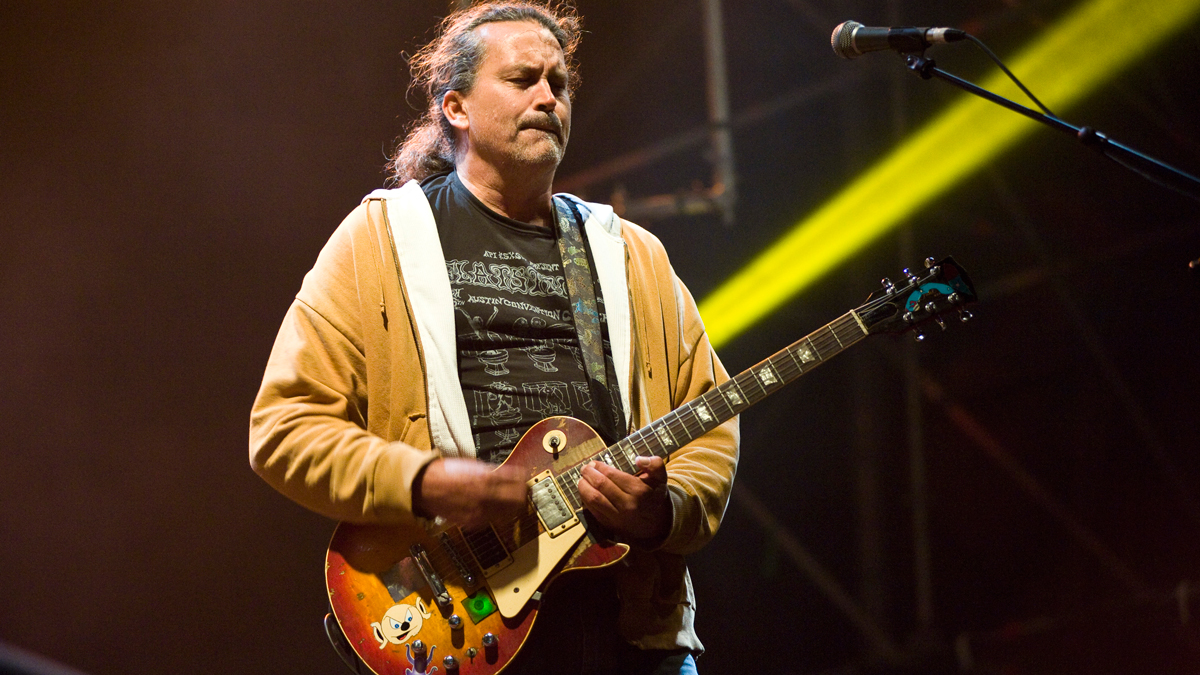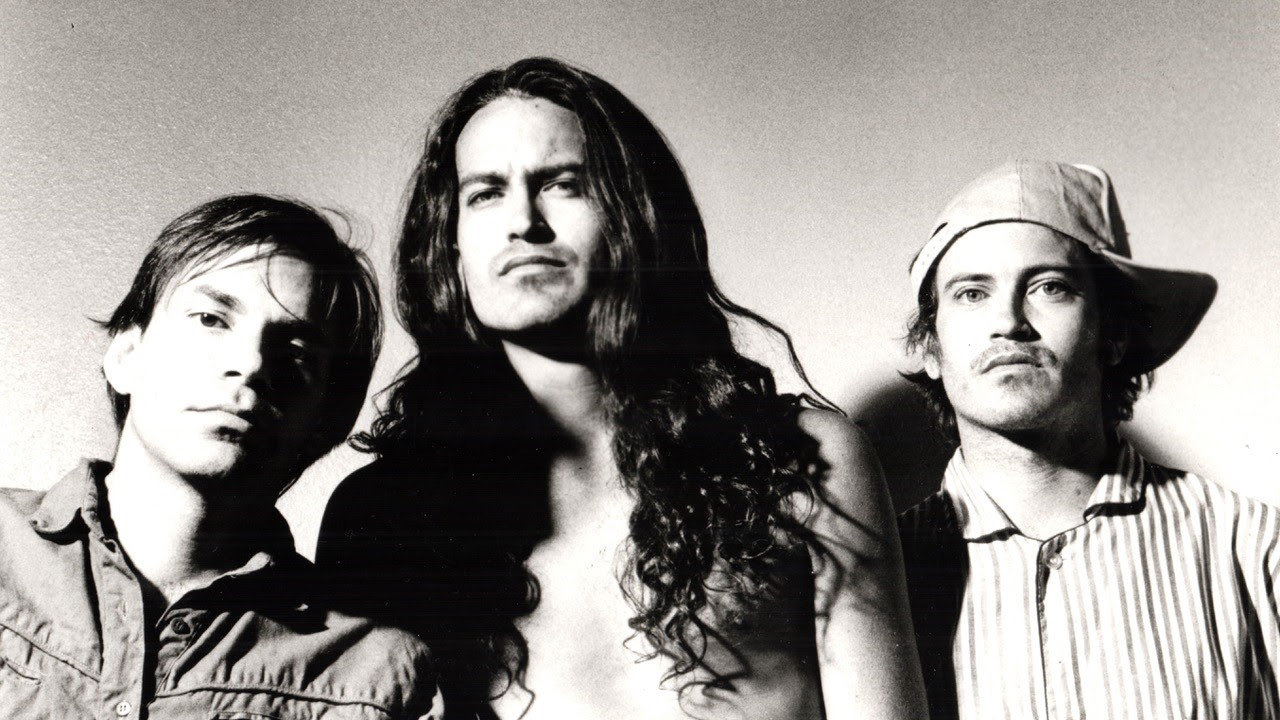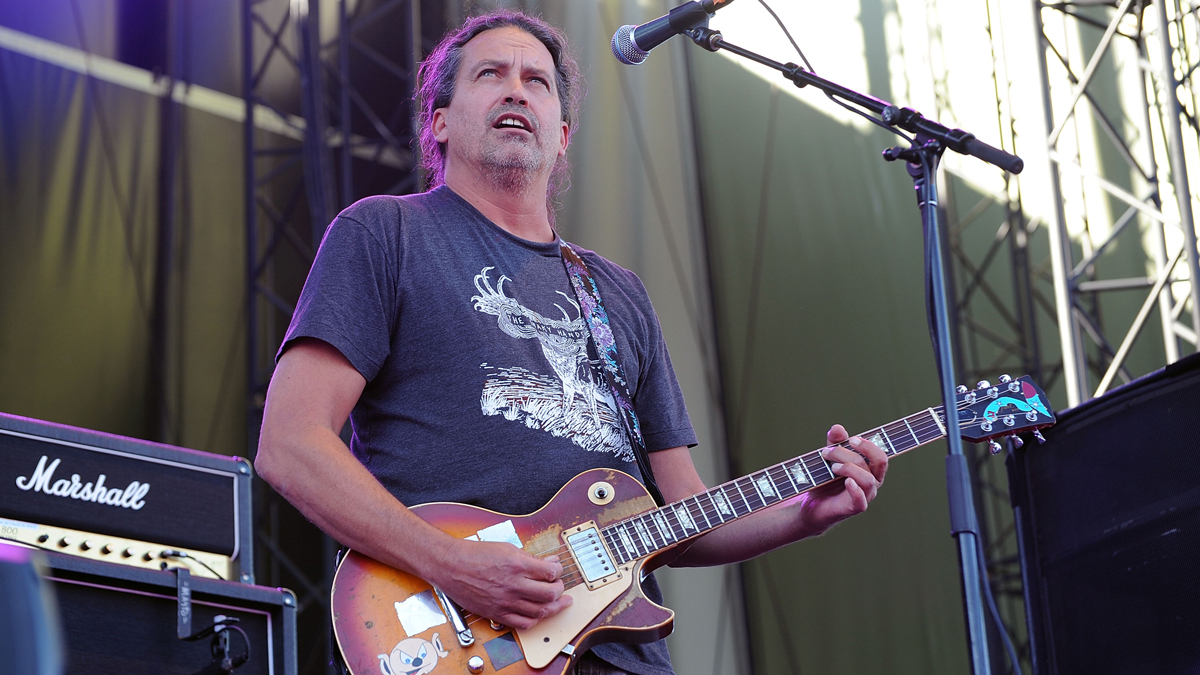Meat Puppets' Curt Kirkwood: “Lead is just like playing air guitar on the real guitar for me”
The inimitable frontman talks playing, plane crashes and powder-blue disco suits

Want all the hottest music and gear news, reviews, deals, features and more, direct to your inbox? Sign up here.
You are now subscribed
Your newsletter sign-up was successful
The Meat Puppets take a lot of beating. The US rock band formed in Phoenix, Arizona by frontman Curt Kirkwood, his brother/Bassist Cris and drummer Derrick Bostrom have endured drug addiction, jail time and numerous close-shaves with calamity.
However, somehow, almost 40 years later, they find themselves wholly intact and ready to perform with their original line-up for the first time in two decades.
Since 1980, they’ve been SST hardcore thrashers, helped invent cowpunk and become a notoriously wild, psychedelic major label liability in the '90s. The latter, partly, thanks to Kurt Cobain’s enthusiastic patronage and a famed three-song appearance at Nirvana’s MTV Unplugged session.
Line-up changes followed as bassist Cris Kirkwood grappled with addiction and drummer Derrick Bostrom removed himself from the band after 1995’s No Joke!, yet the one constant throughout this bludgeoning career has been guitarist, songwriter and frontman Curt - the band’s spiritual leader and inspiring, mercurial guitar talent.
Ahead of the release of new album Dusty Notes, we spoke to Curt about how the return of Derrick Bostrom, selected scrapes with disaster/disco and a blasé approach to mistakes are all mangled into the “loose machine” that is the Meat Puppets of 2019.
Derrick Bostrom is back in the band. What are your memories of the first time you ever met Derrick?
I played in this disco band and we all wore the same three-piece powder-blue suits
“The first time I met Derrick, I’d just turned 18 and I was coming back to Phoenix. I had moved to Canada when I was 17 and tried to become a fishing guide and I lived for this mad summer up in the Northwest Territories. I came back to Phoenix and it was New Year’s Eve of ’77 that I met Derrick. A guy that lived down the street from me took me knew Derrick and some of the guys from the eastside of Phoenix – and I’m from the westside. He took me over to this party and he gave me a hit of acid and I’d never done anything like that before, so I was having a really good time.
Want all the hottest music and gear news, reviews, deals, features and more, direct to your inbox? Sign up here.
“Derrick and all his eastside buddies were there and it was a different kind of crew than I hung out with. They were into progressive music, whereas a lot of the westside listened to Deep Purple and Black Sabbath and Led Zep. They were a little bit more far out than I was used to.”
What drove you to spend time in Canada’s Northwest Territories on your own as a 17-year-old?
“I just loved the outdoors. All through my youth, fishing was an excuse to be outdoors. I haven’t done much of it once I got into music, but through my grandad, I knew someone who owned a floatplane service up there and serviced flying fishing camps, so hit them up and they said, ‘Oh he can work at the floatplane base.’ So I gassed-up floatplanes and took rich people’s trophy fish out of the airplanes and put them in the freezer. [laughs]
“Then I met somebody there who had a fishing camp up in the Arctic Circle and said I could go up there and work for them and run a boat for these sports fishermen. So I took that. But on the way up there, my plane crashed outside of Churchill, Manitoba.”
You were in a plane crash!?
“Yeah, it was kind of nasty. Everybody survived, but what it did was made me miss my job up in the Arctic, so I wound up getting a different job washing dishes and helping cook at a geo-physical survey up at Baker Lake, which is out in the tundra - very remote. It was pretty cool. The sun stays up all the time [in summer], but I could see that life was not really for me.
“It was rough and, really, I started missing the electric guitar. That was the thing, I started thinking, ‘This is close to what I want to do but it’s not quite.’ So I went back to Phoenix and started playing in bands. I played in this band that was a disco band and we all wore the same three-piece powder-blue suits.”
It is hard to imagine you in a powder-blue suit playing disco…
The motivation is still kind of the same: we still want to be able to play one note and have it sound good
“Yeah, it was a lot of fun. I didn’t know shit about playing in bands, really, but it taught me a good sense of rhythm, because that’s all I was doing back there: playing the rhythms and whatever messed up leads I could come up with. I wasn’t very good but everyone else in the band was good and they kind of inspired me to be better. Until they fired me, because they said I smoked too much weed…”
How did your time in Canada affect you? Being in a plane crash must have some influence on a person…
“Definitely. Having survived that, I thought, ‘I’m really lucky, so I’m just only going to do what I really want to do from now on.’ We crashed a ways outside of Churchill, so I wound up hiking for about 10 miles through the scrub outside of Churchill in the middle of polar bear season. I was nervous after the crash, there were only five of us on the plane and the pilot had broken his knee, so I said, ‘Hey, I’ll walk out of here and find some help, just point me in the right direction.’
“That little walk there, err… it was rough. The birds were attacking me – whatever kind of birds they are, all territorial – and I’m just thinking, ‘There’s a polar bear slinking around here somewhere…’ I just thought, ‘Boy, the outdoors is brutal… I’m going to be a musician.’ I didn’t have any idea how to do it, but when I came back I took a course at Phoenix College and that’s where I met the guys that had the disco band.”
Then, soon after, you met Derrick. What struck you as special about the chemistry between the three of you?
“Well, as soon as the three of us started playing together we could see, like, ‘Oh, we can just play one note together and it’s satisfying.’ We saw that right away, that we had a sound as a three-piece. The motivation is still kind of the same: we still want to be able to play one note and have it sound good. And we want the freedom to play whatever we want.
“Now we’ve had my son [Elmo] doing it for the past six years, and Ron Stabinsky [keys] in there. It’s all the same, but now it’s five people doing that same thing. It was always impossible to make mistakes, because we were going to go wherever the thing was going, but now it’s going in five directions – so somebody’s going to do something cool!”

How would you describe your approach to the guitar nowadays?
“I’m still basically a rhythm player at heart. That’s always been my favourite thing. I think I have a good sense of rhythm guitar. My son’s kind of like that, too. It’s fun to play rhythm and just get brainless: repeat, repeat, repeat. Then the leads stuff is just, you know, it’s icing. Frills on top of what’s happening.
“I’ve never worked that hard on a lead style. Both Elmo and I are pretty good at that, but rhythm’s still key to any band. You want to make sure the rhythm is compelling at whatever tempo it is. That’s what it’s all about. You want it to be a loose machine that you can just not think about. Not thinking about it is one of my favourite things.”
It’s funny to hear you talk so dismissively of your lead work when so many people admire it. How did you develop your lead style?
My other bands before The Meat Puppets, mistakes would get me fired, with The Meat Puppets, it’s our band, so we can’t get fired and there are no mistakes
“Oh it’s just cluelessness, desperation… I’ve never been good at learning. I could never sit down and learn leads off of records. I’ve done it, but I’ve never really clinically examined how people are doing this move or that. I just kind of fake it in my mind. I still don’t know a whole lot about music notes, in that way. I know what chords I’m playing and what they’re called but lead is just like playing air guitar on the real guitar for me. If it feels cool, it might sound cool. I’m always reliant on that Miles Davis thing: ‘If you make a mistake, just do it again and it will sound right.’
“There are no mistakes, really, though. That was what was awesome with the Meat Puppets. My other bands before the Meat Puppets, mistakes would get me fired, with the Meat Puppets; it’s our band, so we can’t get fired and there are no mistakes. If it hurts people’s feelings, that’s even better - that’s how we work.”
How many bands were you fired from, do you think?
“Oh, just two!”
Who of all the players you’ve toured with over 40 years has most impressed you?
Kurt Cobain’s guitar playing really agreed well with me. He was a great rhythm player. That inspired me, seeing how that worked live
“Early on, I loved Black Flag. I thought Greg Ginn was a lot of fun. We played a lot of shows with them. One of my favourite live players is Dean DeLeo from Stone Temple Pilots. I’ve played probably more shows with them than any other band over the years, since I first played with them back in 1994. The guy is so laid-back and he’s got a real beautiful sound. He’s just a natural guitar player. He said, ‘Good rock guitar playing has to have some blues in it’, but he’s different. He was a lot of fun to see live.
“Kurt Cobain’s guitar playing really agreed well with me. He was a great rhythm player. That inspired me, seeing how that worked live. I always felt that, with The Beatles, people never said, ‘Oh, John Lennon’s a great guitar player.’ But he was. It’s the rhythm player, too, allowing the drum to be fat and right behind it. That’s how Nirvana was.
“I get inspired just watching anybody play. Guitar’s a fascinating thing to me. I’m not sure why. It’s just fun.”
You never ‘complete guitar’ do you? You’re entangled with it from day one…
“Yeah, and I really laid back on guitar on this latest record. The route of it is just Elmo and I playing acoustic rhythms. That’s where we started it. I just laid down some acoustic tracks and built it from there, because we didn’t have much of an idea. I laid back on the electric a little bit and Elmo really takes more of the leads on this record. I don’t play leads for the first few songs, it’s all Elmo. People keep thinking it’s me but Elmo’s really good, so it was just like, ‘You do it!’ ‘No, you do it!’”

What was your main guitar gear for these sessions?
“There’s two guitars on the whole record that Elmo and I played. My Jimmy Bernard guitar, which is a guy in Phoenix. He built this guitar that’s an exact replica of my ’59 Les Paul [Reissue]. I just got that a few years ago. And then we played a Gibson acoustic that Elmo has.”
“My Gibson ’59 is a 1980 or ’81 reissue. It’s extremely beat-up and it’s what I’ve played all along, so Jimmy made me a really nice replica, which is a really bitching guitar. I brought that out and I’d do my part and then hand it to Elmo. It was his effects pedals as I’d just lost my whole board at some airport. I still have to get more effects before I go and play a bunch of shows. I’ve been bumming them off of Cris and Elmo.”
The Les Paul has been a constant companion. Why a Les Paul?
Les Pauls are the s**t. They’re solid. You can really feel the note being generated through the neck and the body
“I just always thought they were really cool. I got mine when I was 17 and I’m still infatuated with them. I love guitars. I don’t have a whole lot of them, but I have played other stuff. I have a ’65 Tele on Huevos. It still sounds kind of like a Les Paul, because it has a humbucker. I don’t know. Les Pauls are the shit. They’re solid. They have that neck-through-body thing and they look cool. You can really feel the note being generated through the neck and the body.
“I went through a few years where I was playing my Stratocaster, but Elmo liked it, so I said, ‘You play that and I’ll bring my Les Paul back out.’ It’s a nice thing to have a Stratocaster and a Les Paul together. Two Les Pauls get a little cumbersome in the rhythm area.”
Finally, do you consider yourself to be a guitar hero?
“Err… no. I consider myself to still be a guy who likes to play with his buddies. Just a muso. Just a player.”
Dusty Notes is out on 8 March via Megaforce Records.
Matt is a freelance journalist who has spent the last decade interviewing musicians for the likes of Total Guitar, Guitarist, Guitar World, MusicRadar, NME.com, DJ Mag and Electronic Sound. In 2020, he launched CreativeMoney.co.uk, which aims to share the ideas that make creative lifestyles more sustainable. He plays guitar, but should not be allowed near your delay pedals.
